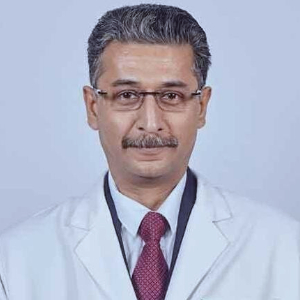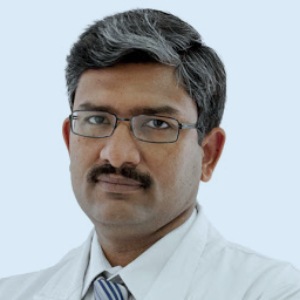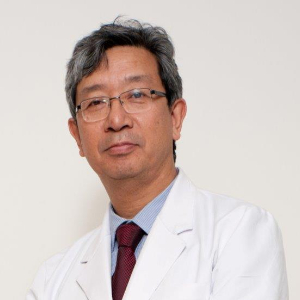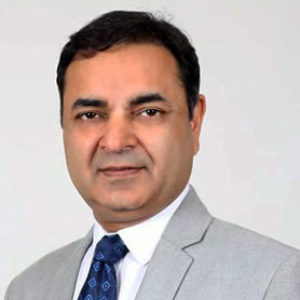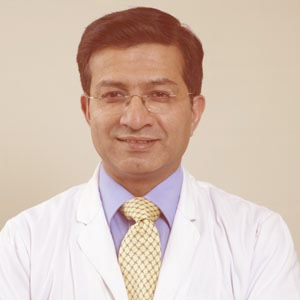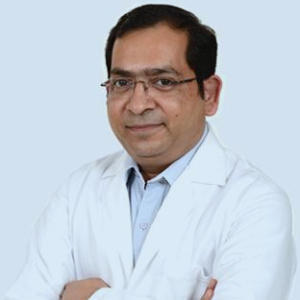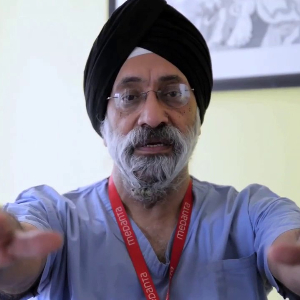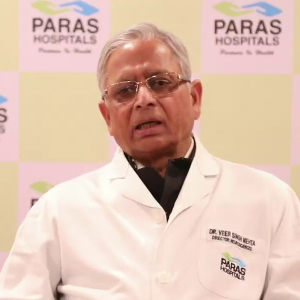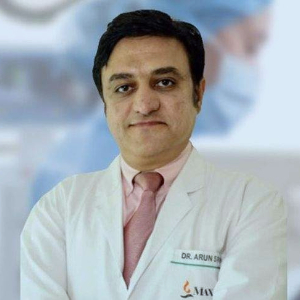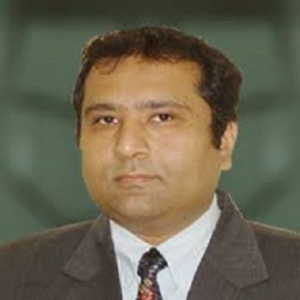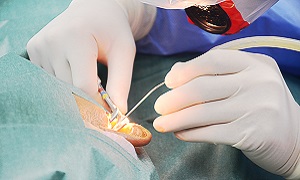Best Doctors in India for Acoustic Neuroma Treatment
- Neurosurgeon, Gurugram, India
- Over 22 years’ experience
Profile Highlights:
- Dr. Sandeep Vaishya is a renowned Neurosurgeon in India, with over 22 years of proficient experience in the field of advanced neurosurgery.
- He has closely worked with some of the top-notch institutes and hospitals in India.
- Dr. Vaishya is regarded as one of the top surgeons of Gamma Knife Surgery in South Africa and is also considered a renowned surgeon for brachial plexus injuries.
- Neurosurgeon, Gurugram, India
- Over 25 years’ experience
Profile Highlights:
- Dr. Aditya Gupta is one of the top Neurosurgeons in India who co-founded the Institute of Neurosciences at Medanta and functioned there as the Additional Director of the Department of Neurosurgery.
- He is an active member of the Congress of Neurological Surgeons (US), Neurological Society of India, International Gamma Knife Society Treasurer, Indian Society for Stereotactic and Functional Neurosurgery, and Skull Base Surgery Society.
- Neurosurgeon, Gurugram, India
- Over 32 years’ experience
Profile Highlights:
- Dr. Rana Patir is one of the most experienced and highly qualified Neurosurgeons in India.
- He holds an extensive experience of 32+ years as a neurosurgeon and has performed more than 10,000 neurosurgical procedures till date.
- Dr. Patir is an expert in all kinds of neuro and spine surgeries with a specialization in minimally invasive brain and spine surgery, Epilepsy surgery, pediatric neurosurgery, and neurovascular surgery.
- Neurosurgeon and Spine Surgeon, New Delhi, India
- Over 25 years’ experience
Profile Highlights:
- Completing over 9000 successful neurological procedures, and still counting, Dr. Sudhir Tyagi is one of the top-notch names in India, diligently catering to neurological assistance with his vast knowledge and adept expertise.
- In fact, Dr. Sudhir Tyagi is the first neurosurgeon to use the Image Fusion Technique to localize targets in the deep part of the brain to perform functional stereotactic surgeries. He has great experience in all types of brain and spine surgeries.
- Neurosurgeon, New Delhi, India
- Over 20 years’ experience
Profile Highlights:
- Dr. Bipin Walia is one of the most famous neurosurgeons who has performed over 7000 successful neurosurgeries so far.
- He earned his MBBS and MS (General Surgery) degree from Armed Forces Medical College, Pune, followed by which his, M.Ch(Neurosurgery) from All India Institute of Medical Sciences, New Delhi.
- Dr. Bipin Walia has over 20 years of experience with his outstanding performance earning him quite some rewards and recognition.
- Neurosurgeon & Spine Surgeon, New Delhi, India
- Over 20 years’ experience
Profile Highlights:
- Dr. Anil Kumar Kansal is a well-known neuro and spine surgeon in Delhi with over 2 decades of experience.
- He has performed over 10,000 neurosurgical procedures including 4500 brain surgeries, 500 endoscopic brain surgeries, 2000 spine surgeries, 400 aneurysms, and 500 anterior cervical microdiscectomies with 60 disc replacement procedures.
- Dr. Kansal holds great skills in aneurysm clippings, neuro-modulation, epilepsy, and neurovascular surgery and has handled several such types of cases in his career.
- Neurosurgeon, Gurugram, India
- Over 30 years’ experience
Profile Highlights:
- Dr. V P Singh is a renowned Neurosurgeon with over 30 years of veteran experience. His competence in cranial, spinal, and peripheral nerves has helped him successfully perform 400+ Intracranial Aneurysm surgical procedures.
- Dr. Singh has also been credited for initiating the Gamma Knife Unit and epilepsy surgery program at All India Institute of Medical Sciences, New Delhi.
- He is proactively involved in the treatment of arteriovenous malformations by radiosurgery techniques and is currently the chairman of the Institute of Neurosciences, Medanta.
- Neurosurgeon, Gurugram, India
- Over 38 years’ experience
Profile Highlights:
- Dr. (Prof.) V S Mehta is a leading Neurosurgeon in India and is considered among the best neurosurgeons in the world.
- He holds an experience of over 38 years in the field and is an expert in Brachial Plexus surgery, brain stem surgery, spinal tumor surgery, brain aneurysms, and brain tumor surgery.
- He has been honored with the Padma Shri for his dedication and contributions to neurosurgery and spine surgery in India.
- In Paras Dr. V S Mehta has been part of the team to first use the Image-Guided Brain Tumor Navigation Technology for Brain tumor surgery in India.
- Neurosurgeon, New Delhi, India
- Over 20 years’ experience
Profile Highlights:
- Dr. Arun Saroha is a renowned Neurosurgeon with extensive experience in the surgical treatment of all kinds of brain and spine disorders.
- He holds an experience of over 20 years in the field and has performed over 8000 neurosurgeries till date for different types of neuro and spinal diseases.
- Dr. Saroha is an expert in minimally invasive spine surgery, neuro-onco surgery, trauma surgery and is also among the few neurosurgeons with expertise in Pediatric neurosurgery.
- Neurosurgeon, Gurugram, India
- Over 20 years’ experience
Profile Highlights:
- Dr. Sudhir Dubey is a leading Neurosurgeon whose primary area of specialization is Endoscopic Neurosurgery and has been perfecting the procedure since 1998. He has also developed various new Endoneurosurgery techniques for surgeries on the brain, spine, and skull.
- He holds an experience of more than 2 decades in neurosurgery and finds interest in skull base surgery, Pituitary tumor surgery, Brain Aneurysm surgery, CyberKnife Radiosurgery, and brain and spine tumor surgeries.
Best Hospitals in India for Acoustic Neuroma Treatment
Indraprastha Apollo Hospital, New Delhi
- City: New Delhi, India
Hospital Highlights:
- Indraprastha Apollo Hospital is a 700-bedded multispecialty hospital in the heart of the capital of India. It is a part of Apollo Hospital group, one of India’s most reputed healthcare chains. Indraprastha Apollo Hospital has been accredited by Joint Commission International, making it the first internationally accredited hospital in the country in 2005.
- There are 52 specialties in the hospital with one of the best cardiology centers in the country. The hospital is also equipped with State of the art infrastructure facilities with the largest Sleep Lab in Asia and the largest number of ICU bed facilities in India.
- The hospital also has one of the largest dialysis units in India along with a dedicated Bone Marrow Transplant unit.
- The latest and highly advanced technologies that are installed in the hospital include Da Vinci Robotic Surgery System, PET-MR, PET-CT, Cobalt-based HDR Brachytherapy, Brain Lab Navigation System, Tilting MRI, Portable CT scanner, 3 Tesla MRI, 128 Slice CT scanner, DSA Lab, Endosonography, Hyperbaric Chamber and Fibro scan.
Fortis Memorial Research Institute, Gurugram
- City: Gurugram, India
Hospital Highlights:
- Fortis Memorial Research Institute is a multi-super-specialty, quaternary care hospital with 1000 beds. The hospital comprises reputed clinicians, and international faculty and is also equipped with cutting-edge technology. The hospital is a part of Fortis Healthcare Limited, a reputed chain of private hospitals in India.
- It is a NABH-accredited hospital that is spread across 11 acres of land and has a capacity of 1000 beds. The hospital has 55 specialties and is one of the premier health care centers in the Asia Pacific region popularly known as “the Mecca of Healthcare”.
- The hospital has 260 diagnostic centers and is also equipped with the latest and advanced techniques that include 3 Telsa which is the world’s first Digital MRI technology. The hospital also has world-class Radiation Therapy techniques which have been developed by leading technology experts from Elekta and Brain Lab.
Apollo Hospital, Chennai
- City: Chennai, India
Hospital Highlights:
- Apollo Hospitals, Chennai, is one of the best hospitals for heart care in India. Over the years, Apollo has expanded all over India, as a healthcare chain.
- India’s first ‘Only Pancreas’ transplant was performed in Apollo Hospital. The hospital is known for successfully performing Asia’s first en-bloc combined heart and liver transplant, and over the years, it has attained a remarkable achievement in the global healthcare space. Around 3-4 organ transplants are performed in the hospital per day.
- Equipped with over 500 beds, this hospital in Chennai was established in 1983 and since then has been among the most preferred hospital for patients from all over the world.
- The hospital holds accreditation of the NABH and JCI and is the first hospital in India to be ISO 9001 and ISO 14001 certified. It is also the first South Indian Hospital to receive subsequent reaccreditation from the JCI USA 4 times.
Medanta-The Medicity, Gurgaon
- City: Gurugram, India
Hospital Highlights:
- One of India’s best and largest multi-specialty hospitals, Medanta was built with the aim to bring India to the highest standards of medical care. The hospital has been providing the best medical services to its patients, since its inception, with care, commitment, and compassion.
- Equipped with 1250 beds, the hospital was founded by Dr. Naresh Trehan in the year 2009 with an aim to provide the best medical care at affordable costs. The hospital is spread across 43 acres and includes 45 operation theatres and 350 beds dedicated solely to ICU. The hospital includes over 800 doctors, and more than 22 specialty departments and has a dedicated floor for individual specialty in order to offer the best services under one roof.
- The hospital is considered one of the premier institutes in India for Cardiac Care and includes staffs and members of high caliber. The hospital has 6 distinct centers of excellence.
Max Super Specialty Hospital, New Delhi
- City: New Delhi, India
Hospital Highlights:
- One of the well-regarded providers in India committed to the highest standards of clinical excellence and patient care, Max Super Specialty Hospital is a part of Max Healthcare, which is the second-largest healthcare chain in India. Regarded as one of the most well-regarded healthcare providers in the country, Max Super Specialty Hospital is committed to the highest standards of clinical excellence as well as patient care. The hospital is also equipped with the latest technology as well as cutting-edge research. The hospital is known to deliver and ensure the highest level of patient care.
- The hospital has more than 500 beds and offers treatment for over 35 specialties. The hospital also holds the credit of having installed the first Brain Suite in Asia. This is a highly advanced Neurosurgical machine that allows MRI to be taken while surgery is ongoing.
- Other advanced and latest technologies are also installed in the hospital such as the 1.5 Tesla MRI machine, 64 Slice CT Angiography, 4D ECHO, LINAC, and 3.5T MRI machine.
Artemis Hospital, Gurugram
- City: Gurugram, India
Hospital Highlights:
- One of the most well-known hospitals in the Delhi NCR, Artemis Hospital is the first hospital in Gurugram to get accredited by the Joint Commission International.
- With more than 40 specialties, the hospital has been designed to be one of the most technically advanced hospitals in the country, with the best medical and surgical health care. The hospital has eleven special and dedicated centers, for Heart, Cancer, Neurosciences, etc.
- The latest technologies in the hospital include Endovascular Hybrid Operating Suite and Flat panel Cath Labs for the cardiovascular department, 3 Tesla MRI, 16 slice PET CT, 64 Slice Cardiac CT Scan, HDR Brachytherapy, and highly advanced Image Guided Radiation Therapy techniques (LINAC) are installed in the hospital.
- The hospital has won several awards as well, since its inception.
BLK Max Super Specialty Hospital, New Delhi
- City: New Delhi, India
Hospital Highlights:
- Equipped with 650 beds, BLK Superspecialty Hospital is the largest stand-alone private sector hospital in Delhi.
- With over 1500 healthcare providers and 150 globally renowned super specialists, the hospital is one of Asia’s largest Bone Marrow Transplant Centres. The hospital is known for having some of the best cancer doctors in the country.
- The hospital is NABH and NABL accredited and was inaugurated by the first Prime Minister of India. Pt. Jawahar Lal Nehru.
Kokilaben Dhirubhai Ambani Hospital, Mumbai
- City: Mumbai, India
Hospital Highlights:
- Kokilaben Dhirubhai Ambani Hospital, Named after the wife of Indian industrialist Dhirubhai Ambani, the founder of Reliance Industries, this is one of the top hospitals in Mumbai. This 750-bed multi-specialty hospital became operational in 2009. Known as one of India’s most advanced tertiary care facilities, the hospital is designed to raise India’s global standing as a healthcare hub, with an emphasis on excellence in clinical services.
- Kokilaben Dhirubhai Ambani Hospital uses Protocol and Care Pathway based treatment models to ensure the best outcomes for patients.
- The hospital represents a confluence of top-notch talent, cutting-edge technology, state-of-the-art infrastructure, and, most importantly commitment.
- The hospital also holds the accreditation of the NABH, NABL, CAP, and JCI.
- The hospital has been recognized as the No. 1 Multispecialty Hospital in Mumbai and the West Zone for the fifth year in a row in 2020 by The Week.
Rela Hospital, Chennai
- City: Chennai, India
Hospital Highlights:
- RIMC is a multi-specialty hospital in a sprawling area of 36 acres located in Chromepet, Chennai, Tamil Nadu, India.
- The facility has 450 beds including 130 critical care beds, 9 operating rooms, modern reference laboratories and radiology services, and is conveniently located near road, rail and air transportation.
- RIMC is led and managed by world-renowned physicians committed to healthcare.
- RIMC offers the broadest range of clinical care, education, and research. The hospital offers state-of-the-art technology and modern treatment facilities designed to provide health care at an affordable cost.
- Rela Institute is driven by patient needs, comfort and confidence.
CARE Hospitals, Hyderabad
- City: Hyderabad, India
Hospital Highlights:
- CARE Hospitals were established in the year 2000, by CARE Group.
- The multispecialty hospital has 435 beds, including 120 critical care beds, with an annual inflow of 180000 outpatients and 16,000 in-patients.
- The hospital provides specialty medical services in Cardiology, Cardiothoracic Surgery, Pediatric Cardiology, Pediatric Cardiothoracic Surgery, Neurology, Neurosurgery, Nephrology, and Urology.
- The hospital has the first dual source, 128 slice CT scanner (for high precision cardiac imaging) – the first of its kind in south India.
- The hospital offers a wide range of accommodation facilities for the convenience of its varied patient base, ranging from general wards to super deluxe rooms.
ACOUSTIC NEUROMA
Acoustic neuroma is a noncancerous growth which can develop on the eighth cranial nerve. Also termed as the vestibulocochlear nerve, it is known to connect the inner ear with the brain, and it consists of two different parts. While one part is responsible for the transmission of sound, the other part helps to send balance information from the inner ear to the brain.
Acoustic neuromas, which may also be termed vestibular schwannomas, or neurilemmomas, generally grow slowly over a period of years. They may not actually invade the brain, but they can push on it as they continue to grow. Larger tumors can press on the nearby cranial nerves that control the muscle of facial expression as well as sensation. If the tumors get large enough to press on the brain stem or the cerebellum, then they can be quite deadly.
Symptoms
Signs and symptoms of acoustic neuroma are mostly subtle, and it can take several years to fully develop. They generally arise from the tumor’s effects on the hearing and balance nerves. Pressure caused by the tumor on the adjacent nerves that control the facial muscles and sensation, brain structures, or nearby blood structures can also cause problems.
As the tumor continues to grow, it might be more likely to cause more noticeable or severe signs and symptoms. Some of the common signs and symptoms of an acoustic neuroma can include the following:
- Hearing loss, which is usually gradual. However, in some cases, it may be sudden. It might also occur on only one side or more pronounced on one side.
- Ringing in the affected ear which is also termed as tinnitus
- Facial numbness and very rarely, weakness or loss of muscle movement
- Unsteadiness, or loss of balance
- Dizziness, which can also be termed as vertigo
In some rare cases, an acoustic neuroma can even grow large enough and compress the brainstem, which may become life-threatening.
If you notice significant hearing loss in one ear, ringing in your ear, or trouble with your balance, then you should consider seeing your doctor soon.
Early diagnosis of an acoustic neuroma might help in keeping the tumor from growing large enough to cause any serious consequences, such as total hearing loss or a life-threatening buildup of fluid within the skull.
Causes
Two types of acoustic neuroma exist: a sporadic form and a form associated with a syndrome which is known as neurofibromatosis type II (NF2). NF2 is an inherited disorder that is characterized by the growth of noncancerous tumors in one’s nervous system. Acoustic neuromas are also known to be the most common of these tumors and they generally occur in both ears by the age of 30.
NF2 is a rare disorder, and it accounts for only around 5 percent of acoustic neuromas. This means the vast majority of the cases are the sporadic form. Doctors are however uncertain what exactly leads to this sporadic form. One of the known risk factors for this condition is exposure to high doses of radiation, especially to one’s head or neck.
Diagnosis
In the early stages, it is generally difficult to diagnose acoustic neuroma, since signs and symptoms might be subtle and can develop over time gradually. Some of the common symptoms include hearing loss, which is associated with several middle and inner ear problems.
After you ask questions about your symptoms, your doctor will be conducting an ear exam. Your doctor might order the following tests.
Hearing test (audiometry)
Imaging
Treatment
There are three main courses of treatment which are used for acoustic neuroma:
- Observation
- Surgery
- Radiation therapy
Observation
Surgery
Surgery for acoustic neuromas involves removing the entire or part of the tumor.
Three main surgical approaches exist, for the removal of an acoustic neuroma:
Translabyrinthine
Translabyrinthine involves making an incision behind the ear and then removing the bone behind the ear along with some of the middle ear. This procedure is generally used for tumors which are larger than 3 centimeters. The upside of this approach is that it can allow the surgeon to see an important cranial nerve or the facial nerve quite clearly before he/she removes the tumor. The downside to this technique is that it causes permanent hearing loss.
Retrosigmoid/sub-occipital
Retrosigmoid/sub-occipital method involves exposing the back of the tumor by opening the skull near the back of one’s head. This approach can be used in order to remove tumors of any size and it also offers the possibility of preserving one’s hearing ability.
Middle fossa
Radiation therapy
Radiation therapy might be recommended in certain cases for acoustic neuromas. Due to state-of-the-art delivery techniques, it is possible to send high doses of radiation to the tumor while at the same time, limiting exposure and damage to any surrounding tissue.
The tumor’s growth might slow or stop or it might even shrink, however, the radiation doesn’t remove the tumor completely.
Complications
An acoustic neuroma can lead to a variety of permanent complications, which can include the following:
- Hearing loss
- Ringing in the ear
- Facial numbness and/.or weakness
- Difficulties with balance
Large tumors may press on your brainstem, which can prevent the normal flow of fluid between the brain and the spinal cord. In this case, fluid may build up in your head, which can increase the pressure inside the skull.

